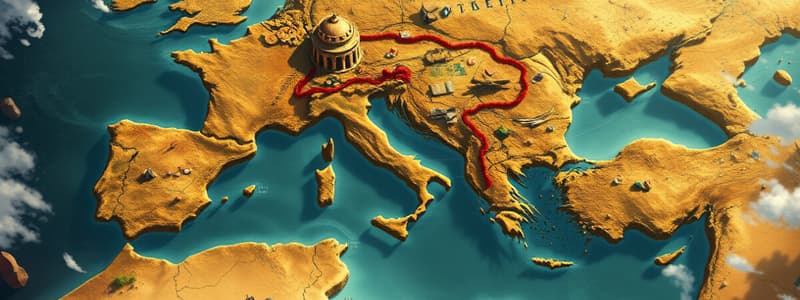Podcast
Questions and Answers
What are the shared characteristics of classical civilizations?
What are the shared characteristics of classical civilizations?
Classical civilizations typically shared characteristics such as a stable food supply, defined social structures, and advanced technological developments.
What are the defining characteristics of city-states, civilizations, and empires?
What are the defining characteristics of city-states, civilizations, and empires?
City-states are independent, self-governing cities; civilizations are large societies with complex social structures and cultures; empires consist of multiple nations or territories under a single sovereign authority.
Why were the Persians able to construct one of the largest empires in the world?
Why were the Persians able to construct one of the largest empires in the world?
The Persians were able to construct one of the largest empires due to very few geographical barriers in their region, allowing for expansive growth.
How did geographical barriers protect the Chinese Empire?
How did geographical barriers protect the Chinese Empire?
What limited the expansion of the Indian Empires?
What limited the expansion of the Indian Empires?
What hindered the expansion of the Roman Empire into Africa?
What hindered the expansion of the Roman Empire into Africa?
How did geography impact the stability of empires?
How did geography impact the stability of empires?
What role did trade play in the survival of empires?
What role did trade play in the survival of empires?
Flashcards are hidden until you start studying
Study Notes
Impact of Geography on Empires
- Geography significantly influences history and the development of civilizations, especially empires.
- Many empires arose in areas where city-states and earlier civilizations existed, benefiting from established infrastructure and resources.
- Favorable geographical features, such as good climates and access to food and resources, were crucial for the development of empires.
- The Persian Empire expanded due to minimal geographical barriers, allowing for considerable growth and territorial control.
- The Chinese Empire was protected from invasions by natural barriers (mountains, deserts) on three sides, leading to long-term stability; additionally, they constructed the Great Wall where natural barriers were absent.
- Indian Empires faced limitations due to geographical features, being surrounded by high mountains which restricted their expansion.
- The Roman Empire's ability to expand into Africa was hindered by the vast Sahara Desert, representing a significant geographical barrier.
- Geographic barriers greatly influenced the stability and conflict levels within empires; regions like the Middle East experienced considerable turmoil due to fewer such barriers.
- The Indian and Chinese Empires had more stability, benefiting from their geographical advantages, which helped maintain their power for extended periods.
Development and Impact of Trade Networks
- Trade networks served as an economic foundation for empires, essential for resource acquisition and sustainability.
- Empires relied on trade to access goods they could not produce locally or lacked the necessary resources to create.
- Trade networks facilitated connections to distant markets, enhancing the supply and demand for goods produced within the empires, thus driving economic growth.
Studying That Suits You
Use AI to generate personalized quizzes and flashcards to suit your learning preferences.




